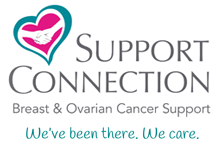By Barbara Cervoni, LMSW, ACSW
Director of Services and Communication
Being diagnosed with cancer is like having the rug pulled abruptly from under your feet. Your world is suddenly turned upside down. You find yourself on a path you never expected to travel, with no idea of where it will take you. At every step along the way, you face new challenges.
Support Connection’s Peer Counselors have traveled that path. They know how it feels to hear the words “You have cancer.” In addition, they speak every day to other women facing their own cancer diagnoses. Each counselor has talked to hundreds of women, helping them sort through feelings and fears, guiding them to find their strength, giving them hope that they’ll get through it.
Here are a few suggestions the Peer Counselors have learned, from their own experiences and from the wisdom of the brave women they talk to every day:
Don’t try to do it alone
- Allow yourself to accept support. It’s not easy. As women, we’re used to doing it all. But this is your time to take care of you.
- Say yes to offers of practical help with day-to-day things like cooking, shopping, etc. Your family and friends will appreciate this. They feel powerless and want to help.
- Clearly communicate your needs to anyone who offers support. Let them know what is and isn’t helpful.
- The emotional roller-coaster is as draining as the physical journey. There are no right or wrong emotions. Find ways to express your feelings – share with others, attend a support group, talk to a counselor, keep a journal. Holding emotions in makes them larger than life.
Enlist the help of your medical team
- Gather a medical team that gives you comfort as well as the confidence that your health needs are being addressed the way you think they should.
- Make the most of your doctor visits. Prepare a list of questions. Bring someone along as a second set of ears and for moral support. Tell your doctor as much as you can about your life so you can discuss treatment options in the context of your daily reality.
- Never hesitate to express your questions and vulnerability to your medical team. This is new for you and very scary. Let your team know what you’re feeling, what your fears are. They need to know so they can treat the whole “you,” but they won’t know unless you tell them.
Take control of information overload
- Put a pad of paper on your nightstand. When you wake up during the night, your head filled with “what if’s,” write them down and make a note of who you’ll call the next day to get your answer. It will help you control the tornado spinning in your head.
- The internet can be a wonderful tool, but remember to proceed with caution. Always stick to reliable sources. More important, remember every person’s cancer is different. Online research can lead to statistics and prognostic information that is not relevant to your specific situation.
- Find other ways to occupy your mind. Word puzzles, knitting, computer games, a good book…. anything to distract you and give you a breather from thinking too much.
Be good to yourself
- Instead of focusing on what you have ahead, look at what you’ve accomplished. Give yourself credit and see your own strength.
- Live in the moment as often as you can. Worrying about the future won’t resolve unknown issues down the road. It only robs you of today.
- Try to take a break from cancer when you can. Engage in things that add joy to your day, activities that help you relax and have fun. This will feed your soul and remind you that you’re much more than your cancer.
- Give yourself permission to move “you” to the top of the list. Leave the guilt behind.
- A cancer diagnosis impacts you mentally, physically and emotionally. You are exhausted on many levels. Allow yourself time to process and heal so you can recover.
